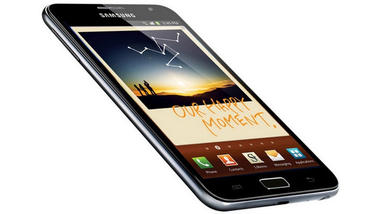Samsung's first witnesses take the stand in Apple patent trial
Day 8 - Apple expert says Samsung owes up to $2.75 billion

Billions of dollars, a "tech monstrosity" and $400-an-hour witnesses were all part of the milieu in the Apple vs. Samsung patent trial Monday.
Apple wrapped its case, though not before a few more witnesses made the argument Apple lost big due to Samsung's alleged infringement on several of its patents.
Apple's patent chief was back on the stand, telling the court that despite bringing a licensing agreement to Samsung in 2010, the Cupertino company wasn't willing to hand over "untouchable" patents related to the iPhone's user interface.
The deal, which offered $30 (£19.20) per touchscreen phone sold and $40 (£25.50) per tablet, only covered certain patents, Boris Teksler revealed Monday.
Apple generally doesn't license its design products to other companies, he continued, though he said Apple and Microsoft have a cross-license agreement covering design patents pertaining to this case.
However, special "anti-cloning" provisions exist in that agreement. The companies "couldn't copy" each other, Teksler said.
Survey 'explains' customers' mistake
In a case not wanting for revelatory documentation, Apple presented a 2010 survey looking into why customers who considered iPhones chose Androids instead.
Get daily insight, inspiration and deals in your inbox
Sign up for breaking news, reviews, opinion, top tech deals, and more.
Forty-three percent of customers "Wanted to stay with current provider," according to the survey, and didn't choose Android's because they were superior phones or had a better OS.
The answer to score the least percentage points – 25 percent – was that customers "Wanted latest and greatest technology." Two percent more said they "Preferred Android Market."
Dollars and damages
After Teksler testified, video taped dispositions of several Samsung executives played as a prelude to Terry Musika, an accountant, taking the stand.
If Samsung is found guilty of infringement, Musika estimated it would owe Apple between $2.5 billion (£1.59 billion) and $2.75 billion (£1.75 billion).
Samsung, Musika figured, has sold 22.7 million smartphones and tablets that allegedly infringe on Apple patents, making about $8.16 billion (£5.2 billion) in revenue and $2.24 billion (£1.42 billion) in profit.
However, upon cross, Samsung lawyer Bill Price pointed out iPhone 4's were hard to find for several months after the device's release, making calculating actual sales lost by Apple difficult as Apple couldn't sell the phone anyway.
While he was able to provide hard and fast figures, Musika pointed out there are inconsistencies in some Samsung data. How the company handles money for tax purposes will also compound the difficulty in determining actual amounts.
Citing IDC figures, Musika also said Samsung's share of the smartphone market skyrocketed once it started producing the phones it's accused of copying from Apple.
Apple's case rests
After about half-a-day's worth of witness testimony, Apple rested its case, wrapping up it's arguments by stating it potentially lost two million iPhone and iPad sales thanks to Samsung's alleged infringement.
In dollars, that comes to $488.8 million (£ 3.11 million).
Immediately following the closure of their case, Samsung filed a motion stating Apple failed to prove infringement and as such, U.S. District Judge Lucy Koh should rule in their favor.
Koh refused rebuked the motion, however, she did rule that the Galaxy S GT-i9000, the Galaxy S2 GT-i9100 and the Galaxy Ace be removed from the list of accused devices based on Samsung's assertion that they were never sold directly in the U.S.
The trial is only covering U.S.-sold devices and while these phones were knocked off, Samsung must still prove that more than 17 other products don't infringe on Apple's patents.
Picking up on 'prior art'
Samsung's first witness of the three-week-old trial was Ben Bederson, a computer professor at the University of Maryland who'd speak to the issue of prior art.
Samsung attorney's maintains the South Korean company's device designs were the result of a design Zeitgeist and Apple's designs aren't as unique as they claim.
The $400-an-hour witness, who's worked 100 hours on the case to date, spoke about his research on device zooming capabilities in the time before smartphones.
Bederson claimed his team's research concluded in 2004 and the first information about zooming technology was released in 2005.
Bederson's research looked at finger (not a stylus) touching a screen using "tiles," similar to icons found on smartphones.
Adam Bogue would also speak to Samsung's prior art defense.
"Diamond Touch," technology Bogue helped develop in 2003 for computer screens, was presented to demonstrate Apple used "functional" technology prevalent everywhere, not just in the iPhone.
Oddly enough, Bogue showed Diamond Touch to Apple.
Bogue, who'll get $400-an-hour for his work on the trial, also divulged he had a snap back feature - what Apple calls its patented "rubber band" effect – on technologies he developed in 2005, even taking it to trade shows.
Before Bogue's time was up, Apple would get Samsung's legal team to produce the Diamond Touch, as the law firm representing the South Korean company now owns it after a sale from Bogue.
Described as a "tech monstrosity on a tripod" by San Jose Mercury News reporter Howard Mintz, the device reportedly looks nothing like Apple's crisp iPhone.
The trial picks back up again tomorrow and will continue everyday this week.
Via The Verge, AllThingsD and San Jose Mercury News
Michelle was previously a news editor at TechRadar, leading consumer tech news and reviews. Michelle is now a Content Strategist at Facebook. A versatile, highly effective content writer and skilled editor with a keen eye for detail, Michelle is a collaborative problem solver and covered everything from smartwatches and microprocessors to VR and self-driving cars.
